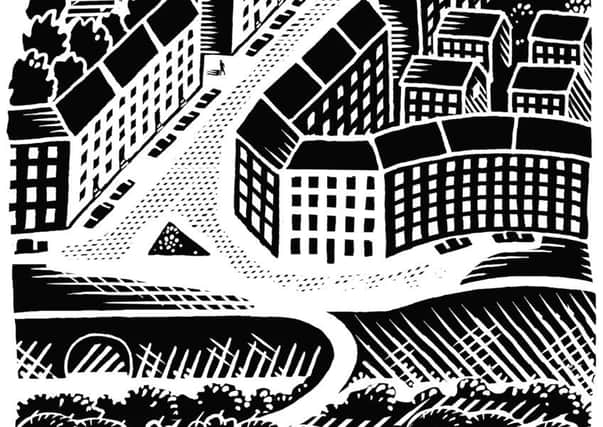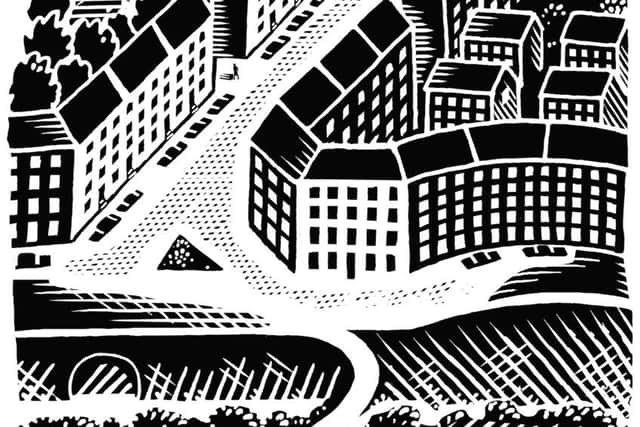44 Scotland Street: He never thought of love


These yards were still largely an empty expanse of ground, one of those urban spaces that somehow seem to survive the avaricious eyes of developers. “Spaces are important,” she said to Bertie. “There are things, you see, and then there is the space that lies next to things. The space defines the thing every bit as much as the thing defines itself. You understand that, don’t you Bertie?” Bertie had nodded. The idea could be put more simply, he thought, but he understood.
The second bedroom was Bertie’s. He was inordinately proud of this room, which was his sanctuary, his retreat – his boy-cave. The room had been much-painted: Irene had decorated it in pink to begin with, as a gesture against stereotyping, but shortly afterwards Stuart, egged on by Bertie, had painted it white, to the considerable annoyance of Irene. Unfortunately for Bertie, who had been thoroughly embarrassed about living in a pink room, the coat of white paint had been insufficiently thick to prevent pink from somehow seeping through, with the result that his room was now of a shade in-between the two colours but still recognisably pink in the eyes of any of Bertie’s friends who came to the house.
Advertisement
Hide Ad“How nice that you live in a pink room,” pronounced Olive when she was brought to play – without invitation from Bertie, but at the instance of Irene. “I thoroughly approve of new boys, Bertie – I really do. You’d never get somebody like Tofu living in a pink bedroom. He doesn’t have the courage.”


“It’s not really pink,” muttered Bertie. “It’s … it’s crushed strawberry.”
‘Oh no, Bertie,” said Olive. “It’s not crushed strawberry. I know what crushed strawberry looks like, and this isn’t it. This is dusty pink. I saw this exact colour in a magazine and it said it was pink. There was a picture of a girl in a dusty pink bedroom. They said it was the ideal feminine colour.”
“It’s not,” muttered Bertie. “It’s nothing to do with that.”
“Of course these days things like that don’t matter,” continued Olive. “Girls are very happy that boys want to be like them. We are going into the Age of the Girl, you know. I read that too. This is the Age of the Girl. Boys are finished – did you know that, Bertie? Boys are finished.”
Contiguous with Bertie’s bedroom was the third bedroom, the smallest of the three, but larger, of course, than the windowless box room next door. This bedroom was now the nursery, and was occupied by Ulysses and the extraordinarily large quantity of impedimenta that constitute the support system for any baby: changing mats, stacked cartons of wet wipes, plastic devices for serving, catching, and disposing of food, piles of muslin cloth, bins for detritus of every category, and so on. Hanging from the ceiling were various mobiles, devices with strings that played repetitive tunes, and small silver stars intended somehow to induce a feeling of sleepiness at bedtime.
Advertisement
Hide AdThis bedroom had been cleared by Stuart in preparation for his mother’s visit. The cot in which Ulysses slept had been shifted into the box room, and the various support systems had been dispersed about the house. With the infantile objects now elsewhere, the room had shrugged off its nursery feel. A small writing desk from the main bedroom had been moved in, along with an easy chair from the living room. With flowers on the desk and a fresh pot-pourri on the windowsill, the feel of the room was welcoming, even if a slight smell, inadequately masked by the pot-pourri, still lingered in the air.
“My Dad says your room won’t smell too much of Ulysses after a couple of days,” said Bertie as he showed his grandmother into her room.
Advertisement
Hide Ad“I’m sure it’ll be just fine,” said Nicola, moving across the room to open the window. “I hope poor little Ulysses won’t mind having been moved out of his room.”
Bertie shook his head. “He doesn’t know what’s going on,” he said. “He’s got no idea of anything, really.
“Oh Bertie, I’m sure Ulysses is drinking it all in,” said Nicola brightly. “Babies know more than we give them credit for.”
“You can use his chest of drawers over there,” said Bertie. “We chucked all his stuff out.”
Nicola opened her suitcase and began to unpack. It was a strange feeling, she decided, this going back in time. How long was it since she had looked after a child? She did not like to count the years. Decades, rather. So long ago. And now these two little souls, this lovely little boy, Bertie, with his serious expression and his odd way of putting things; and that funny little scrap of humanity that was his brother … My flesh and blood, she thought. Mine.
And in the kitchen, where he was making a cup of tea to welcome Nicola, Stuart thought: I still have a mother. A mother. There is still somebody who can say That is my son. Me. He watched the water in the glass-side kettle begin to move – tiny currents of heated water mixing with layers of colder water, a miniature watery turmoil. It all started there, he thought. It all started with the movement of water. It’s very easy to go back. It’s very easy to go back to being the child in the relationship, the dependent one; no matter how many years have intervened, it is easy to revert to how it was before, to the time when you knew instinctively that your mother loved you and that her love was always there like the sun, constant, always available, never for a moment critical or conditional.
Advertisement
Hide AdLove. He never thought of love. Did other people? Did other people go about their daily business thinking about love; about the people they loved and the people who loved them? Did people wake up in the morning and say to themselves Perhaps this will be the day I find love? Did they really do that?
Did he love anybody at all? Did he love his mother, as he knew she loved him? He loved her, of course, but he was not sure exactly how he loved her. Did he love his boys? Yes, he did. He loved them – even Ulysses, sometimes. But did he love Irene, his wife? Did he love her? Why had he never cried, not once, since she went away? Was that the test – the real test – whether we could cry for somebody?
FOLLOW US
SCOTSMAN TABLET AND MOBILE APPS